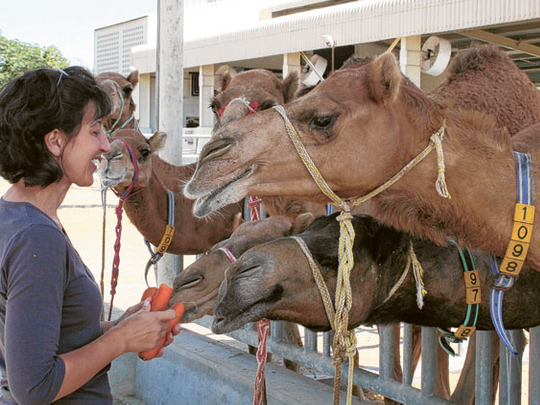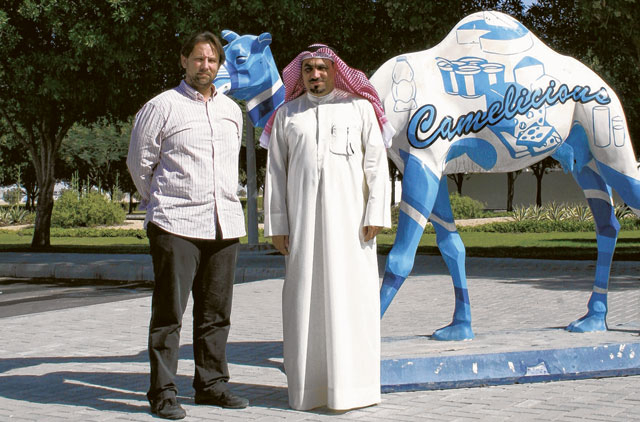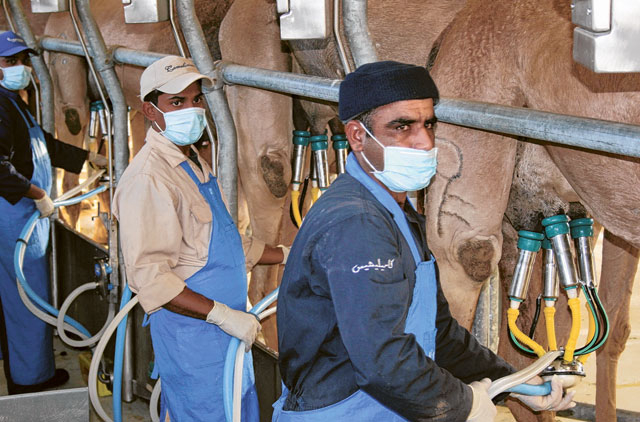
Dubai: It is not known to many that right on the outskirts of Dubai, in the small settlement of Umm Nahad, a gem of the UAE's very own industries lies hidden: The camel farm of Emirates Industry for Camel Milk and Products, better known under the catchy brand name Camelicious.
It is nothing less than the largest camel farm worldwide, farm manager Dr Peter Nagy, a veterinarian specialist from Hungary, told Gulf News. The premises accommodate some 2,000 camels which give 3,500 to 4,000 litres of precious milk per day.
The milk is used for plain camel milk and flavoured milk drinks as well as for laban drinks and sold in class A supermarkets throughout the country, Mutasher Al Badry, deputy general manager of Emirates Industry for Camel Milk and Products, told Gulf News during a visit to the camel farm last week. The company for the first time allowed a journalist to enter the premises, which are normally sealed off like a high-security area, and take pictures of the milking of the camels.
Unique pilot project
The whole project started in 2002 at the Central Veterinary Research Laboratory in Dubai, after it has been accepted by Dubai's government to build up a camel farm and a dairy as a unique pilot project in Umm Nahad at a budget of $20 million (Dh73.56 million). Planning and construction lasted until 2005 before the farm was able to deliver its first commercial products, according to Al Badry.
"There is a surprisingly high local demand," he said, adding that due to limited production the camel milk drinks are not exported yet, apart from a small amount that is shipped to Jordan. A significant part of the production is also sold to the nearby Al Nassma chocolate factory, which produces highly sought-after camel milk chocolate.
However, the Camelicious people are working hard on increasing the milk output and inventing new products. One of those is flavoured camel milk powder which is meant for restaurants and caterers, another one is a beauty crème based on camel milk, created together with French cosmetics brand Le Secret Naturel, which concentrates on organic and natural beauty products.
Permission
The next big step could be the approval by the European Commission to sell camel milk products from the UAE in Europe, which would be able to boost exports. "We expect a visit by EU Commission representatives in January, and maybe we'll get the permission in May," Al Badry reckons.
All this would be a step closer to profitability. "We are heading to the break even," Al Badry says. "But it is important to say that the farm was originally started as a non-commercial research centre, with everything under one roof." It was the aim of the project to develop special knowledge in breeding and milking camels. The idea of commercialising the outcome came only later, Al Badry says. Currently, Camelicious employs 194 staff. The company is fully owned by the Dubai Government.
The production depends heavily on availability of "good" camels. The animals are sourced from the UAE and neighbouring countries, where Camelicious scouts are constantly looking out for them to purchase larger quantities. Quality camels in the region are priced at around Dh25,000 to Dh30,000 each. The farm, in fact, is capable of accommodating three times more than the current 2,000 camels, Nagy says.














